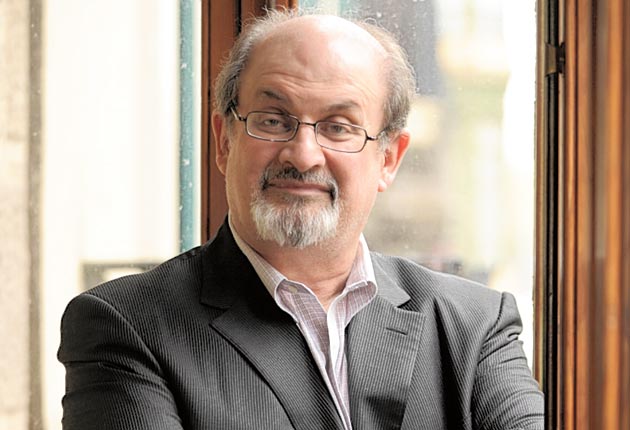The 'unfilmable' book comes to the big screen
Midnight's Children to be the first Rushdie work to be made into a movie

Your support helps us to tell the story
From reproductive rights to climate change to Big Tech, The Independent is on the ground when the story is developing. Whether it's investigating the financials of Elon Musk's pro-Trump PAC or producing our latest documentary, 'The A Word', which shines a light on the American women fighting for reproductive rights, we know how important it is to parse out the facts from the messaging.
At such a critical moment in US history, we need reporters on the ground. Your donation allows us to keep sending journalists to speak to both sides of the story.
The Independent is trusted by Americans across the entire political spectrum. And unlike many other quality news outlets, we choose not to lock Americans out of our reporting and analysis with paywalls. We believe quality journalism should be available to everyone, paid for by those who can afford it.
Your support makes all the difference.After a literary career spanning three decades, Sir Salman Rushdie will at last see one of his novels transferred to the cinema.
A Toronto-based film company has been awarded a grant which means that production of a screen version of Rushdie's 1981 novel Midnight's Children can begin.
The novelist has been working for two years with the director Deepa Mehta on a script of a film version of the book that originally made his reputation. This week, the Harold Greenberg Fund, set up by the Canadian media firm Astral in honour of one of Canada's leading film directors, announced it was giving an award for "polishing and packaging" the script.
Deepa Mehta, an Indian-born Canadian who has known Rushdie for many years, is best known for her trilogy Fire, Earth and Water, which she directed between 1996 and 2005. She and her husband, David Hamilton, run up the film company Hamilton Mehta, in Toronto. He will produce the film, which she will direct.
The book's protagonist, Saleem, is born in Bombay at midnight on 15 August 1947, the moment when India became independent, who discovers that all Indian children born in that first hour have magical powers.
The novel won the Booker Prize in 1981, then 12 years later was named the "Booker of Bookers". In 2008, in a contest to mark Booker's 40th anniversary of the prize, was again singled out as the best novel ever to win the prize.
But until now no one has attempted to film this or any other Rushdie novel. This is partly because the genre in which he writes, magical realism, does not easily translate into cinema. Many of the best-known magic realist novels, such as One Hundred Years of Solitude by Gabriel Garcia Marquez, and The Master and Margarita by Mikhail Bulgakov, have proved too intimidating for commercial cinema.
Interviewed by The Times of India earlier this year, Rushdie said: "Now that we have a screenplay we like, I would say that, yes, Midnight's Children is eminently filmable. I have been a film buff all my life and believe that the finest cinema is fully the equal of the best novels."
In Rushdie's case, there is the added problem that he had to go into hiding for 10 years, and any public association with him was potentially dangerous. His ordeal began after a Muslim MP in India protested that his fourth novel, The Satanic Verses, published in 1988, had insulted Islam. After riots in Britain and Kashmir, Iran's supreme ruler, Ayatollah Khomeini, pronounced a fatwa that was incitement to kill Rushdie and anyone involved in publishing The Satanic Verses.

Watch Apple TV+ free for 7 days
New subscribers only. £8.99/mo. after free trial. Plan auto-renews until cancelled

Watch Apple TV+ free for 7 days
New subscribers only. £8.99/mo. after free trial. Plan auto-renews until cancelled
The decision to award him a knighthood, in 2007, was applauded by the literary establishment but provoked protests around the world. The governments of Iran and Pakistan summoned the British ambassadors to register formal protests.
Sir Salman was born in India but moved to the UK when he was 13. Earlier this year, he and Mehta visited Mumbai to meet some of the stars of Bollywood and begin pulling together a cast, which will include Irrfan Khan, who played the police inspector in Slumdog Millionaire, and Seema Biswas, star of the 1994 film Bandit Queen. During the visit, Rushdie said that one of the hardest aspects of his years in hiding was that he was prevented from seeing India again.
Long road to the screen
Salman Rushdie is not the only writer whose work has taken decades to get from print to cinema
*The Fellowship of the Ring, the first part of J J R Tolkein's epic, was published 47 years before Peter Jackson translated it into a successful film. An earlier attempt at a cartoon was a failure.
*Russia's favourite 20th-century novel, Mikhail Bulgakov's The Master and Margarita, written in the 1930s, was long assumed to be unfilmable until a heavily state-subsidised 10-part adaptation was shown on Russian TV in 2005.
*Gabriel Garcia Marquez's 1967 magical realist masterpiece, One Hundred of Years of Solitude, has never been filmed though his other novels have.
*J D Salinger shunned all approaches to film his classic The Catcher in the Rye.
Join our commenting forum
Join thought-provoking conversations, follow other Independent readers and see their replies
Comments